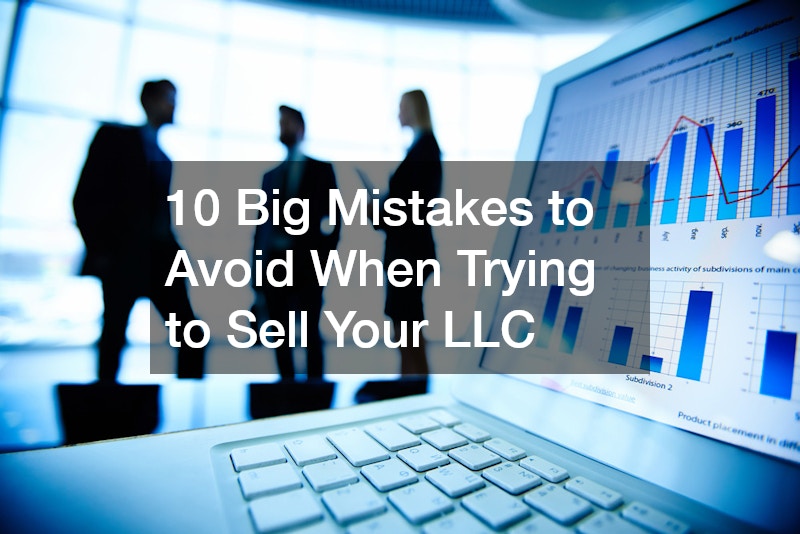Selling an LLC is a major milestone for any business owner, whether you’re managing a small plumbing company, a marine AC business, or a moving business. The process can be lucrative, offering the chance to capitalize on years of hard work, but it also comes with its fair share of pitfalls. Many entrepreneurs rush into the sale without fully understanding the complexities involved, which can result in financial losses, legal disputes, or even a failed transaction. To sell your LLC successfully, careful planning, accurate documentation, and professional guidance are crucial.
The stakes are particularly high because selling an LLC involves multiple layers of preparation. From legal compliance to tax planning, every detail can impact the final outcome. Business owners often make mistakes that are easy to overlook, especially when they are emotionally attached to their company or under pressure to close the deal quickly. These mistakes can scare away potential buyers, reduce the value of the business, or complicate the transfer process.
In this guide, we’ll explore the top mistakes to avoid when trying to sell your LLC. By highlighting common errors across various types of businesses—including plumbing companies, marine AC companies, and tree removal companies—we’ll provide practical advice to help you navigate the sale process more effectively. With the right preparation and professional support, you can maximize your business’s value, minimize risks, and achieve a smooth transition to new ownership. Understanding these pitfalls before listing your business can make all the difference in turning a successful sale into a rewarding experience.
1. Neglecting Legal Compliance

One of the most critical mistakes business owners make when trying to sell your LLC is neglecting legal compliance. From state regulations to federal requirements, every aspect of your LLC’s legal standing must be in order. Working with a knowledgeable business attorney can help ensure that your company is compliant and ready for sale. Non-compliance can scare away buyers or lead to legal disputes that derail the transaction.
A business attorney can review your contracts, permits, licenses, and any ongoing legal matters to make certain everything is in proper order. They can also advise on the best way to present your LLC to potential buyers, making the transaction smoother and less risky. Skipping this step may result in delays or loss of trust with buyers, which can ultimately reduce the value of your business.
Many sellers also underestimate how quickly minor compliance gaps can escalate once due diligence begins. Something as small as an expired permit, a missing annual report, or an outdated business license can trigger deeper scrutiny from buyers and their legal teams. When that happens, the entire deal may slow down, or buyers may push for price reductions to offset perceived risk. Taking time to update filings, resolve past-due fees, and confirm that your LLC is in good standing with state agencies helps prevent unnecessary complications. This preparation shows buyers that the business has been responsibly managed, which can strengthen their confidence and support smoother negotiations.
2. Not Preparing a Clear Operating Agreement
A clear and comprehensive operating agreement is essential when you sell your LLC. Many business owners overlook this document or fail to update it, causing confusion during the sale. Engaging a local lawyer to help draft or review your operating agreement ensures that ownership percentages, profit distribution, and decision-making processes are clearly defined.
Without a solid operating agreement, buyers may hesitate to move forward, fearing future disputes or hidden obligations. A well-prepared agreement not only provides transparency but also demonstrates professionalism and credibility, making your LLC more attractive to potential buyers.
3. Mispricing Your LLC
Setting the right price is crucial when you sell your LLC. Overpricing or underpricing your business, whether it’s a plumbing company or any other type of LLC, can significantly impact your chances of a successful sale. Pricing too high can deter serious buyers, while pricing too low may leave money on the table.
Professional valuation services or market analysis can help you determine a realistic price. Buyers often perform their own assessments, and discrepancies between your expectations and market value can complicate negotiations. Taking the time to research comparable sales in your industry ensures that your LLC is competitively priced.
Many business owners also misprice their LLC because they rely too heavily on emotion rather than market data. After years of pouring time, effort, and personal resources into a company, it’s easy to overvalue the business based on sentiment rather than documented performance. Buyers, however, focus on facts—financial trends, customer retention, equipment condition, and long-term stability. When your asking price is inflated due to emotional attachment, it can stall negotiations or drive serious buyers away before discussions even begin. Taking a data-driven approach helps you avoid these pitfalls and positions your LLC more favorably during buyer evaluation.
Undervaluing your LLC can be just as damaging. Some owners price their businesses too low because they fear disappointing potential buyers or want a fast sale. While a quick transaction may seem appealing, leaving money on the table can create long-term regret—especially if the company has strong contracts, a loyal customer base, or proven growth potential. A low price may also give buyers the impression that something is wrong with the business, creating unnecessary suspicion. Striking a fair, well-researched price shows confidence in your company’s value and helps you attract buyers who are serious, informed, and willing to negotiate in good faith.
4. Ignoring Proper Valuation Methods

Valuing your LLC accurately is more than just looking at annual revenue or profits. Ignoring proper valuation methods can lead to disputes or lost opportunities, particularly in specialized sectors like a marine AC company. Factors such as asset quality, client contracts, and growth potential all play a role in determining a fair price.
Using multiple valuation approaches—asset-based, income-based, and market-based methods—can provide a more complete picture. Professional appraisers or accountants familiar with your industry can help guide this process, ensuring that the valuation reflects the true worth of your business. Buyers are more likely to trust a transparent valuation, which can streamline negotiations and facilitate a faster sale.
5. Overlooking Financial Documentation
Many entrepreneurs fail to maintain comprehensive financial records, which can create problems when you sell your LLC. Detailed documentation—including balance sheets, profit and loss statements, tax returns, and cash flow reports—is essential. Buyers, especially those looking to invest in an established enterprise, want a clear picture of your company’s financial health.
Entrepreneurs who neglect these records may appear disorganized or untrustworthy, potentially reducing the value of the business. Maintaining accurate financial documentation also allows for quicker due diligence, preventing delays in the sale process. A well-organized financial record demonstrates professionalism and builds buyer confidence.
Beyond basic records, detailed supporting documentation can make a significant difference during due diligence. Buyers often want to see invoices, contracts, payroll records, and expense receipts to verify the financial statements you provide. Without these documents, even a profitable business may appear disorganized or risky, giving buyers reason to negotiate a lower price or walk away entirely. Maintaining organized, easily accessible records signals professionalism and reduces the time and stress involved in the sale process.
Additionally, consistent financial documentation helps identify areas where the business can be strengthened before listing. Reviewing your books may uncover unnecessary expenses, uncollected receivables, or underperforming revenue streams that can be addressed to boost profitability. By proactively resolving these issues, you not only improve your financial presentation but also increase the overall value of your LLC. This approach demonstrates foresight to buyers and can lead to faster negotiations and more favorable terms.
6. Failing to Address Outstanding Debts

Outstanding debts are a significant red flag for buyers. When selling a business, it’s essential to identify and address any existing liabilities. Whether your business is a general business or a niche industry, ignoring debts can complicate the sale and reduce your negotiating leverage.
Addressing debts beforehand—either by paying them off or clearly outlining arrangements for handling them—shows buyers that the business is financially sound. Clear communication about liabilities avoids surprises that could derail a deal and protects your reputation throughout the sale process.
7. Hiding Operational Issues
Attempting to hide operational issues is another common mistake when you sell your LLC. Problems such as outdated equipment, staffing challenges, or customer service issues can significantly impact a buyer’s decision. For example, owners of a moving business who fail to disclose operational shortcomings may face delayed sales or contract disputes.
Transparency is key. Presenting operational challenges alongside solutions or improvement plans demonstrates professionalism and honesty. Buyers appreciate candid disclosure, and addressing issues proactively can enhance the overall perceived value of your business.
Operational transparency goes beyond simply disclosing problems—it also involves showing how you’ve managed challenges and improved processes over time. Buyers are not necessarily looking for a flawless operation; they want confidence that the business can continue to run successfully after the sale. Providing evidence of standard operating procedures, maintenance logs, employee training programs, or customer satisfaction initiatives reassures buyers that the company is well-managed and resilient, even if some issues exist.
Failing to disclose operational challenges can backfire during due diligence. If buyers discover hidden problems on their own, it can damage trust, lead to renegotiations, or even cause the sale to collapse. By being upfront and offering solutions or improvement plans, you demonstrate professionalism and integrity. This approach not only protects your reputation but can also increase the perceived value of your LLC, as buyers appreciate a candid and proactive management style.
8. Ignoring Tax Implications

Tax considerations play a major role in the sale of an LLC. Ignoring them can result in unexpected liabilities for both the seller and the buyer. For a local propane company and similar businesses, understanding capital gains, depreciation recapture, and state-specific taxes is critical before finalizing a sale.
Consulting with a tax professional allows you to structure the sale in a way that minimizes liabilities and maximizes returns. Proper planning also helps buyers feel confident in the financial aspects of the transaction, reducing friction and facilitating a smoother process.
9. Rushing the Sale Process
Many business owners make the mistake of rushing the sale process, often due to emotional attachment or financial pressure. Selling a tree removal company or any other LLC too quickly can result in poor negotiations, overlooked details, and missed opportunities for higher offers.
Taking the time to prepare your business, gather documentation, and engage professionals ensures a more strategic sale. Rushing increases the risk of errors, reduces buyer confidence, and may lead to unfavorable terms that could have been avoided with patience.
10. Skipping Professional Advice
Trying to sell your LLC without professional advice is a common yet costly mistake. Whether you own a house appraisal company or another type of business, engaging experts—such as attorneys, accountants, and business brokers—can guide you through valuation, legal compliance, and negotiations.
Skipping professional guidance often leads to overlooked liabilities, improper pricing, or poorly structured agreements. Professionals bring experience, industry knowledge, and negotiation skills that can help you secure a higher value for your LLC while avoiding costly pitfalls. Their involvement often reassures buyers and adds credibility to the transaction.
Selling an LLC is a significant undertaking that requires careful preparation, attention to detail, and professional guidance. By avoiding the mistakes outlined above—including neglecting legal compliance, failing to prepare a clear operating agreement, mispricing your LLC, ignoring proper valuation methods, overlooking financial documentation, failing to address outstanding debts, hiding operational issues, ignoring tax implications, rushing the sale process, and skipping professional advice—you can maximize the value of your business and facilitate a smooth transaction.
Each of these mistakes has the potential to delay or derail a sale, erode buyer confidence, or reduce the ultimate price you receive. Business owners who take the time to plan carefully, engage the right professionals, and maintain transparency throughout the process are more likely to achieve a successful outcome. Whether you operate a plumbing company, marine AC business, moving business, tree removal company, or house appraisal company, preparation is key.
Ultimately, selling your LLC is not just about completing a transaction—it’s about ensuring that your hard work is recognized and fairly compensated. By understanding common pitfalls and addressing them proactively, you can avoid unnecessary complications and secure a sale that meets your financial goals while providing confidence and clarity to buyers. A thoughtful, strategic approach ensures that the transition to new ownership is smooth, professional, and profitable.
